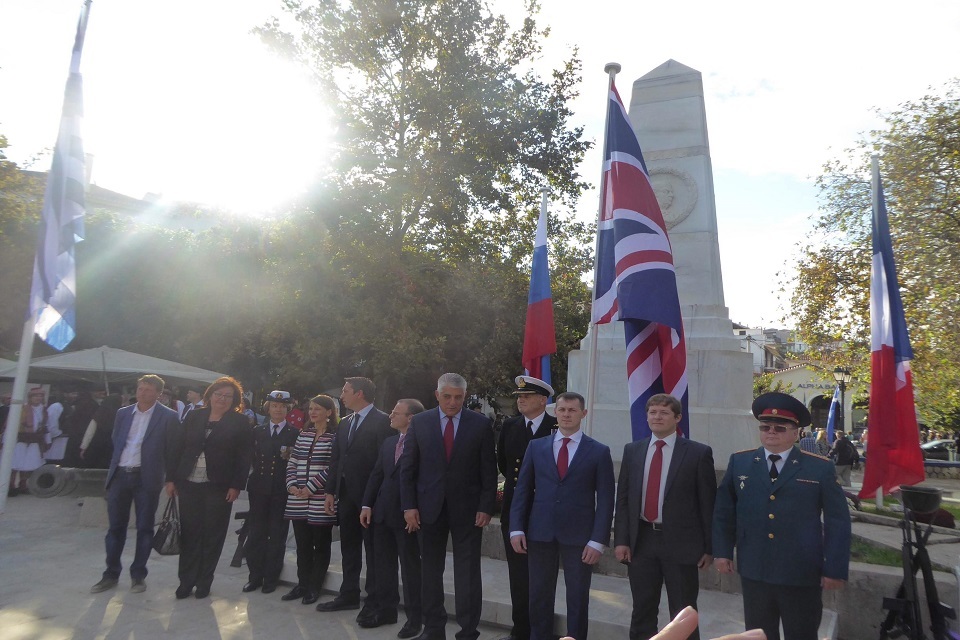Commemoration of the Battle of Navarino
20 October 2016, Address of the British Ambassador to Greece, John Kittmer.

[Courtesy greetings]
It is a pleasure to be here again in Pylos. This is one of my favourite places in Greece. As we drove down yesterday, I was reminded from the hills that the location of the town, the beauty of Spakteria, the haunting presence of the two castles, the crystal waters of Navarino itself - all are unparalleled. And today everything lies in beautiful peace.
On this day 189 years ago, however, a bystander on these hills would have had a very different impression.
In the morning light, he would have seen 65 fighting ships of the Turkish-Egyptian fleet, lying at anchor in the bay, drawn up in the shape of a horseshoe. From about 2pm, he would have seen Admiral Codrington’s flagship Asia, lead another 11 British ships, 7 French ships and 8 Russian ships into the bay.
The Turks sent a small boat to dissuade Codrington, but he issued the magnificent response,
I have come to give orders and not receive them.
By 2.15pm three British ships had anchored within the horseshoe. All seemed calm. But a peaceable attempt by the captain of the Dartmouth to parley with the officers of two Turkish fire ships was repulsed with murderous gunfire. By 2.30pm a general engagement had been enjoined.
Few of us today can imagine what a naval battle in the nineteenth century was like. The deafening roar of cannon, the smoke, the explosions, the flying splinters, the fires, the smell, the confusion, the screams of the wounded. Codrington’s son Henry took part in the battle as a midshipman and was injured. He has left us a harrowing account:
“On going down the ladder,” he wrote, “I found myself in the dark and in an atmosphere which was as hot, though not so pure, as many an oven. On the chests, the men’s mess tables had been laid, and over them beds; on these lay the wounded, some too bad to speak, others groaning and crying out…”
The battle was known for its sheer bloody brutality.
But it was also known for the astonishing determination and superior skill of the three allied fleets.

navarino
The battle lasted some four hours. By nightfall, the result was clear. The British, French and Russian allies had lost 174 sailors, but not one allied ship had been destroyed. It was noted at the time that “The harmony with which the ships of the allies operated was incredible….[as if they] belonged to one single nation”. By contrast, at least 60 enemy ships were totally destroyed, perhaps some 6000 Turco-Egyptian sailors lost their lives.
In England at least, the victory excited political controversy for a while. But today, we are proud of Navarino, we are proud of what the three fleets achieved, proud that they shattered the Ottoman will to hang on to Greece, proud that they liberated this great nation.
I am approaching the end of my four-year term as British Ambassador. In these four years, the Royal Navy has worked closely and effectively with the Hellenic Navy. We are partners in NATO. We share a similar view of the dangerous world we inhabit. We plan together and train together. For nearly 200 years, we have nearly always stood together. We share traditions of seamanship and ties of strongly held mutual respect.
For the liberation of Greece and the ideal of freedom, 75 British sailors lost their lives at Navarino, alongside 40 French and 59 Russian allies. I am moved to be remembering them here today with you. In the traditional Greek words: “Everlasting their memory”.
Let me close by congratulating and thanking the Regional Governor and Mayor for this magnificent event. The Battle of Navarino has created an indissoluble bond between Greeks and Britons. I dare to say: “Everlasting our friendship”.
John Kittmer Her Britannic Majesty’s Ambassador 20 October 2016